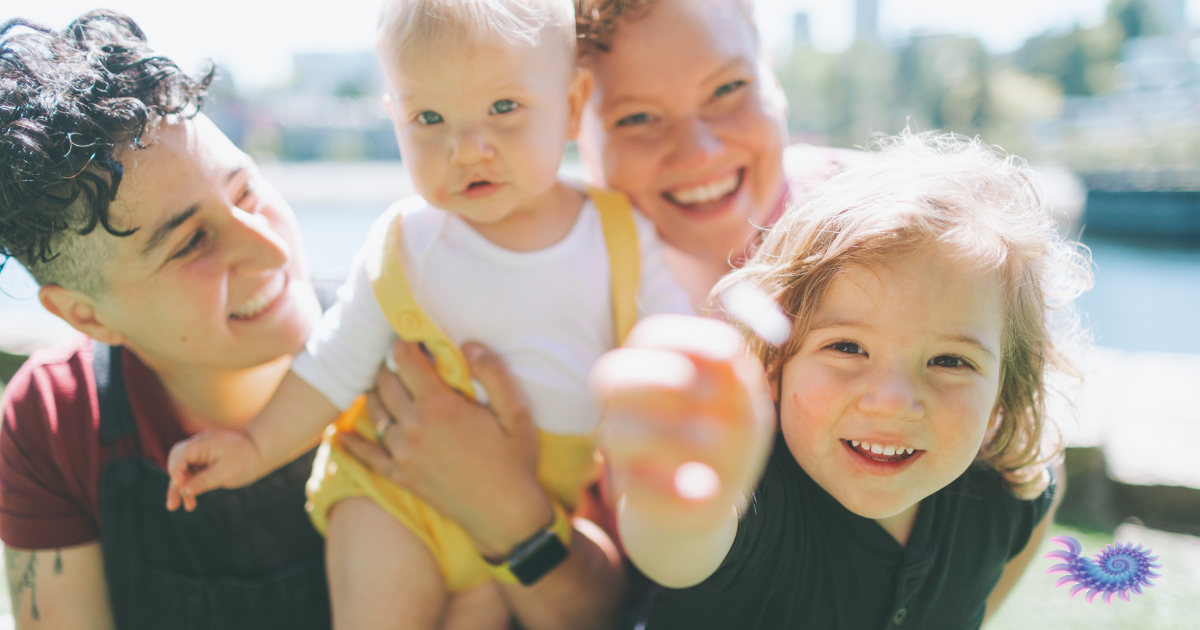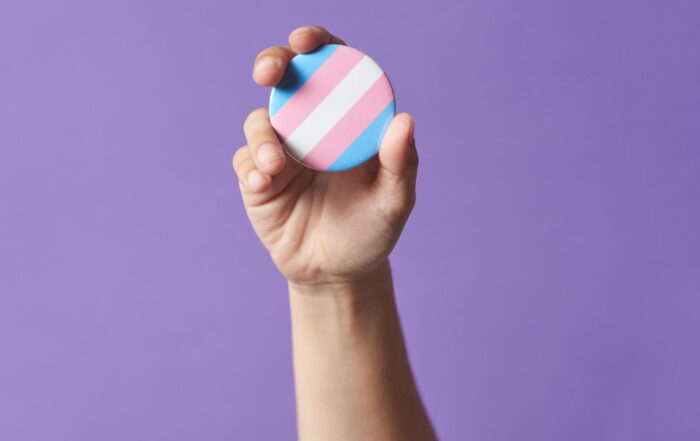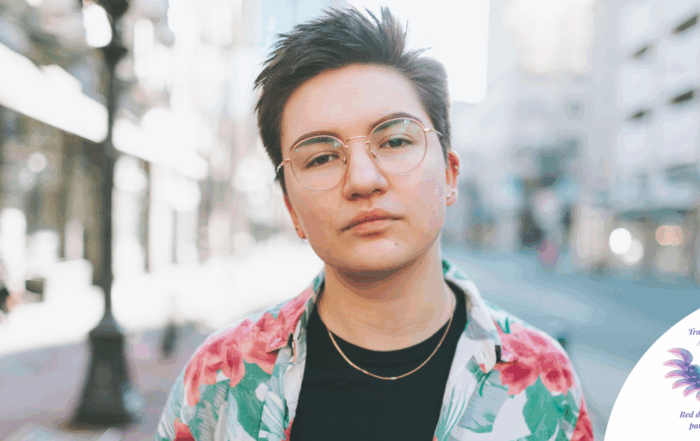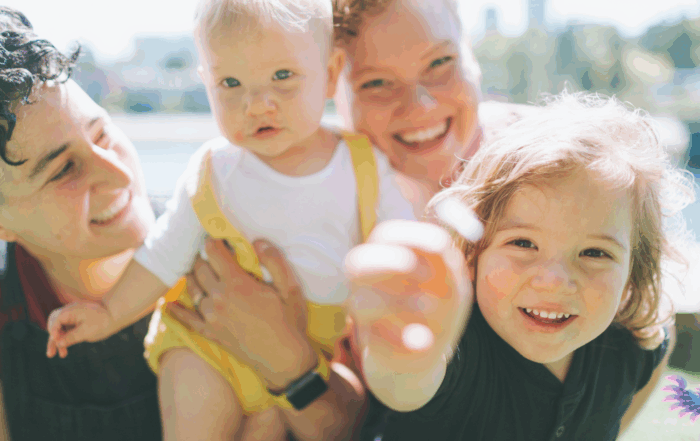This post was first published in Spanish as part of our outreach to Spanish-speaking parents and caregivers of trans, nonbinary, and gender diverse youth. We are sharing it here in English so that more families can connect with the message of compassion, presence, and unconditional love during those first life-changing moments of a child’s gender journey.
Cuando mi hija me dijo que era mi hijo: el primer segundo que lo cambia todo
Ese instante en que un ser querido te revela su identidad trans puede sentirse como una sacudida. No sabemos qué decir, cómo reaccionar, ni si estamos a la altura de lo que esa verdad necesita para ser contenida amorosamente. Pero ahí mismo, en ese primer segundo, puede comenzar el amor más valiente que una familia puede ofrecer.
Nunca se está verdaderamente preparadx y no importa cuán abiertos de mente creamos ser, o cuánto amemos a nuestrxs hijxs, hermanxs, sobrinxs. El momento en que nos dicen: “No soy quien pensabas que era”, tu mundo tiembla un poco… ¡o mucho! Y es normal, es humano.
Puede aparecer el silencio, el miedo, la confusión, la tristeza, y llegan las preguntas que solo torturan pero no resuelven nada: ¿qué hice mal? ¿es acaso mi culpa? ¿por qué no lo vi venir? Esto no quiere decir que no amemos, sino que esa verdad cambia una imagen que llevábamos adentro.
Lo que quiero decirte es que ese primer segundo no te define, pero puede abrirlo todo. Puede ser el comienzo de una relación nueva. Más real, más profunda y más honesta.
La familia puede experimentar un duelo, no por la persona, sino por la imagen que la representaba en nuestra mente, y eso también necesita ser reconocido. Puede que sientas que algo se desarma, que el lenguaje ya no te alcanza y que el mundo no va a entender. Lo que vas a necesitar antes de aprender el tema, es desaprenderlo primero. Pero no quiere decir que tengas que hacerlo en soledad; nada de eso.
Nuestra comunidad de familias como la tuya también pensaron: “¿Estoy haciendo esto bien?” Y hoy, más que nunca, sabemos que amar sin entenderlo todo es un primer paso poderosísimo.
Tu reacción puede sanar -o herir- profundamente y lo que digas (o no digas) en ese momento se graba en el corazón de quien confía en ti. No necesitas tener todas las respuestas…
Solo necesitas ser un refugio.
Puedes decir cosas como:
- “Gracias por confiar en mí.”
- “Te amo. Y eso no cambia.”
- “No sé todo, pero quiero aprender contigo.”
Y, sobre todo, escuchar activamente y validar desde tu corazón lo que te están confiando, que por algo será. Es un gran acto de amor de no invalidar, aunque no entendamos nada.
Cosas simples que pueden acompañar profundamente
- Usa el nombre y pronombres que tu ser querido elige. No es una moda. Es afirmación y respeto.
- No pidas explicaciones forzadas. Cada persona trans tiene su propio ritmo.
- Evita invalidar: “Pero si antes eras…” o “¿Estás segurx?”.
- Acompaña sin condiciones. El amor incondicional se demuestra en las decisiones pequeñas: en cómo nombramos, en cómo miramos, en cómo sostenemos.
Esto no es el final. Es un nacimiento.
Cuando un ser querido trans nos dice su verdad, no está rompiendo la familia, está pidiendo pertenecer como realmente es. Ese primer momento puede ser caótico., pero también puede ser el portal hacia un amor más auténtico, más consciente, más libre.Si estás leyendo esto…
¡No estás solx!
La Transfamily Alliance existe para tender redes educación desde la ciencia y de acompañamiento entre familias que quieren aprender, sanar, abrirse. Y si tú estás en esa orilla, dudando, confundidx, sintiendo que no sabes cómo hacerlo…
¡Ya empezaste bien!
Porque estás buscando. Estás sintiendo. Estás amando.
“Mi hija me dijo que era mi hijo.
Y aunque me tembló el alma,
mi amor no se rompió.
Se volvió más fuerte.
Más real.
Y en ese instante que parecía tan difícil
algo hermoso nació.”

¿En qué etapa del Viaje de Género está tu familia…?
Haz nuestro quiz GRATIS y descubre las diferentes fases del Viaje de Género, en cuál te encuentras y qué puedes hacer para apoyar mejor a tu hije trans y/o no binarie.
When My Daughter Told Me She Was My Son: The First Second That Changes Everything
That moment when a loved one reveals their trans identity can feel like a jolt. We don’t know what to say, how to react, or if we are capable of holding that truth with the love it deserves. But right there, in that very first second, the bravest love a family can offer can begin.
We are never truly prepared, no matter how open-minded we think we are or how much we love our children, siblings, nieces, or nephews. The moment they say: “I’m not who you thought I was,” your world shakes a little… or a lot! And that is normal—it’s human.
Silence, fear, confusion, sadness may appear, along with questions that only torture but solve nothing: What did I do wrong? Is this my fault? Why didn’t I see it coming? This doesn’t mean we don’t love them—it simply means that truth shatters the image we had carried inside.
What I want you to know is that this first second does not define you, but it can open everything. It can be the beginning of a new relationship—more real, deeper, and more honest.
Families may go through a kind of grief—not for the person themselves, but for the image we once held of them in our minds. And that too needs to be recognized. You may feel something is falling apart, that language isn’t enough, that the world won’t understand. Before you learn, you may first need to unlearn. But you don’t have to do it in isolation—not at all.
Our community of families, just like yours, also once thought: “Am I doing this right?” And today, more than ever, we know that loving without fully understanding is one of the most powerful first steps.
Your reaction can heal—or deeply wound—and what you say (or don’t say) in that moment leaves an imprint on the heart of the one who trusts you. You don’t need to have all the answers…
You just need to be a refuge.
You can say things like:
-
“Thank you for trusting me.”
-
“I love you. And that doesn’t change.”
-
“I don’t know everything, but I want to learn with you.”
And above all, listen actively and validate from your heart what they are sharing—because if they are telling you, it means something. It is a great act of love not to invalidate, even when we don’t understand.
Simple Things That Offer Deep Support
-
Use the name and pronouns your loved one chooses. It’s not a trend. It’s affirmation and respect.
-
Don’t demand forced explanations. Every trans person has their own rhythm.
-
Avoid invalidating comments like: “But you used to be…” or “Are you sure?”
-
Accompany without conditions. Unconditional love is shown in the small decisions: how we name, how we look at them, how we hold them.
This is not an ending. It is a birth.
When a trans loved one tells us their truth, they are not breaking the family—they are asking to belong as they truly are. That first moment may feel chaotic, but it can also be the gateway to a love that is more authentic, more conscious, and more free.
If you are reading this…
You are not alone!
Transfamily Alliance exists to create networks of education based on science and mutual support among families who want to learn, heal, and open themselves. And if you are standing at that edge—doubting, confused, feeling like you don’t know how to do this…
You’ve already started well.
Because you are searching. You are feeling. You are loving.
“My daughter told me she was my son.
And even though my soul trembled,
my love did not break.
It became stronger.
More real.
And in that moment that seemed so difficult,
something beautiful was born.”
What Stage of the Gender Journey Is Your Family In?
Take our FREE quiz and discover the different phases of the Gender Journey, where you are now, and what you can do to better support your trans and/or nonbinary child.
This post was first published in Spanish as part of our outreach to Spanish-speaking parents and caregivers of trans, nonbinary, and gender diverse youth. We are sharing it here in English so that more families can connect with the message of compassion, presence, and unconditional love during those first life-changing moments of a child’s gender journey.
Cuando mi hija me dijo que era mi hijo: el primer segundo que lo cambia todo
Ese instante en que un ser querido te revela su identidad trans puede sentirse como una sacudida. No sabemos qué decir, cómo reaccionar, ni si estamos a la altura de lo que esa verdad necesita para ser contenida amorosamente. Pero ahí mismo, en ese primer segundo, puede comenzar el amor más valiente que una familia puede ofrecer.
Nunca se está verdaderamente preparadx y no importa cuán abiertos de mente creamos ser, o cuánto amemos a nuestrxs hijxs, hermanxs, sobrinxs. El momento en que nos dicen: “No soy quien pensabas que era”, tu mundo tiembla un poco… ¡o mucho! Y es normal, es humano.
Puede aparecer el silencio, el miedo, la confusión, la tristeza, y llegan las preguntas que solo torturan pero no resuelven nada: ¿qué hice mal? ¿es acaso mi culpa? ¿por qué no lo vi venir? Esto no quiere decir que no amemos, sino que esa verdad cambia una imagen que llevábamos adentro.
Lo que quiero decirte es que ese primer segundo no te define, pero puede abrirlo todo. Puede ser el comienzo de una relación nueva. Más real, más profunda y más honesta.
La familia puede experimentar un duelo, no por la persona, sino por la imagen que la representaba en nuestra mente, y eso también necesita ser reconocido. Puede que sientas que algo se desarma, que el lenguaje ya no te alcanza y que el mundo no va a entender. Lo que vas a necesitar antes de aprender el tema, es desaprenderlo primero. Pero no quiere decir que tengas que hacerlo en soledad; nada de eso.
Nuestra comunidad de familias como la tuya también pensaron: “¿Estoy haciendo esto bien?” Y hoy, más que nunca, sabemos que amar sin entenderlo todo es un primer paso poderosísimo.
Tu reacción puede sanar -o herir- profundamente y lo que digas (o no digas) en ese momento se graba en el corazón de quien confía en ti. No necesitas tener todas las respuestas…
Solo necesitas ser un refugio.
Puedes decir cosas como:
- “Gracias por confiar en mí.”
- “Te amo. Y eso no cambia.”
- “No sé todo, pero quiero aprender contigo.”
Y, sobre todo, escuchar activamente y validar desde tu corazón lo que te están confiando, que por algo será. Es un gran acto de amor de no invalidar, aunque no entendamos nada.
Cosas simples que pueden acompañar profundamente
- Usa el nombre y pronombres que tu ser querido elige. No es una moda. Es afirmación y respeto.
- No pidas explicaciones forzadas. Cada persona trans tiene su propio ritmo.
- Evita invalidar: “Pero si antes eras…” o “¿Estás segurx?”.
- Acompaña sin condiciones. El amor incondicional se demuestra en las decisiones pequeñas: en cómo nombramos, en cómo miramos, en cómo sostenemos.
Esto no es el final. Es un nacimiento.
Cuando un ser querido trans nos dice su verdad, no está rompiendo la familia, está pidiendo pertenecer como realmente es. Ese primer momento puede ser caótico., pero también puede ser el portal hacia un amor más auténtico, más consciente, más libre.Si estás leyendo esto…
¡No estás solx!
La Transfamily Alliance existe para tender redes educación desde la ciencia y de acompañamiento entre familias que quieren aprender, sanar, abrirse. Y si tú estás en esa orilla, dudando, confundidx, sintiendo que no sabes cómo hacerlo…
¡Ya empezaste bien!
Porque estás buscando. Estás sintiendo. Estás amando.
“Mi hija me dijo que era mi hijo.
Y aunque me tembló el alma,
mi amor no se rompió.
Se volvió más fuerte.
Más real.
Y en ese instante que parecía tan difícil
algo hermoso nació.”

¿En qué etapa del Viaje de Género está tu familia…?
Haz nuestro quiz GRATIS y descubre las diferentes fases del Viaje de Género, en cuál te encuentras y qué puedes hacer para apoyar mejor a tu hije trans y/o no binarie.
When My Daughter Told Me She Was My Son: The First Second That Changes Everything
That moment when a loved one reveals their trans identity can feel like a jolt. We don’t know what to say, how to react, or if we are capable of holding that truth with the love it deserves. But right there, in that very first second, the bravest love a family can offer can begin.
We are never truly prepared, no matter how open-minded we think we are or how much we love our children, siblings, nieces, or nephews. The moment they say: “I’m not who you thought I was,” your world shakes a little… or a lot! And that is normal—it’s human.
Silence, fear, confusion, sadness may appear, along with questions that only torture but solve nothing: What did I do wrong? Is this my fault? Why didn’t I see it coming? This doesn’t mean we don’t love them—it simply means that truth shatters the image we had carried inside.
What I want you to know is that this first second does not define you, but it can open everything. It can be the beginning of a new relationship—more real, deeper, and more honest.
Families may go through a kind of grief—not for the person themselves, but for the image we once held of them in our minds. And that too needs to be recognized. You may feel something is falling apart, that language isn’t enough, that the world won’t understand. Before you learn, you may first need to unlearn. But you don’t have to do it in isolation—not at all.
Our community of families, just like yours, also once thought: “Am I doing this right?” And today, more than ever, we know that loving without fully understanding is one of the most powerful first steps.
Your reaction can heal—or deeply wound—and what you say (or don’t say) in that moment leaves an imprint on the heart of the one who trusts you. You don’t need to have all the answers…
You just need to be a refuge.
You can say things like:
-
“Thank you for trusting me.”
-
“I love you. And that doesn’t change.”
-
“I don’t know everything, but I want to learn with you.”
And above all, listen actively and validate from your heart what they are sharing—because if they are telling you, it means something. It is a great act of love not to invalidate, even when we don’t understand.
Simple Things That Offer Deep Support
-
Use the name and pronouns your loved one chooses. It’s not a trend. It’s affirmation and respect.
-
Don’t demand forced explanations. Every trans person has their own rhythm.
-
Avoid invalidating comments like: “But you used to be…” or “Are you sure?”
-
Accompany without conditions. Unconditional love is shown in the small decisions: how we name, how we look at them, how we hold them.
This is not an ending. It is a birth.
When a trans loved one tells us their truth, they are not breaking the family—they are asking to belong as they truly are. That first moment may feel chaotic, but it can also be the gateway to a love that is more authentic, more conscious, and more free.
If you are reading this…
You are not alone!
Transfamily Alliance exists to create networks of education based on science and mutual support among families who want to learn, heal, and open themselves. And if you are standing at that edge—doubting, confused, feeling like you don’t know how to do this…
You’ve already started well.
Because you are searching. You are feeling. You are loving.
“My daughter told me she was my son.
And even though my soul trembled,
my love did not break.
It became stronger.
More real.
And in that moment that seemed so difficult,
something beautiful was born.”
What Stage of the Gender Journey Is Your Family In?
Take our FREE quiz and discover the different phases of the Gender Journey, where you are now, and what you can do to better support your trans and/or nonbinary child.








